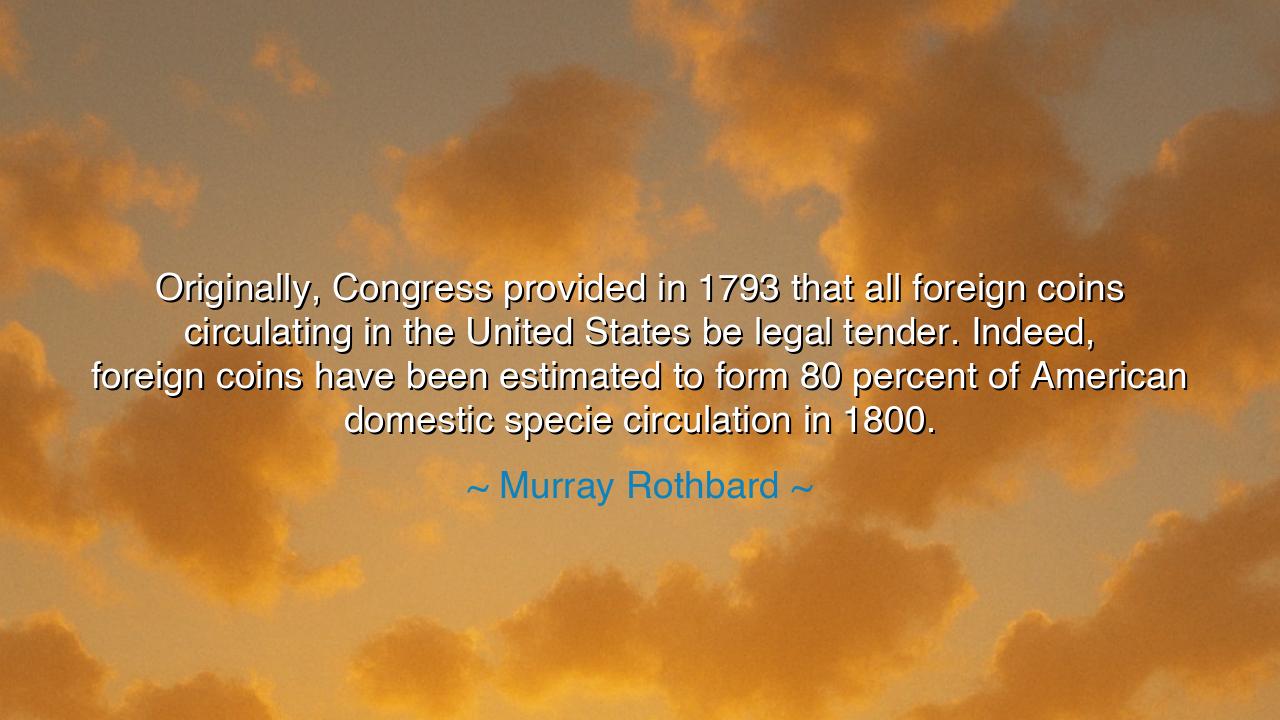
Originally, Congress provided in 1793 that all foreign coins
Originally, Congress provided in 1793 that all foreign coins circulating in the United States be legal tender. Indeed, foreign coins have been estimated to form 80 percent of American domestic specie circulation in 1800.






In the annals of a young nation, the flow of wealth and the instruments of exchange have always revealed much about the fabric of society. Murray Rothbard’s words, “Originally, Congress provided in 1793 that all foreign coins circulating in the United States be legal tender. Indeed, foreign coins have been estimated to form 80 percent of American domestic specie circulation in 1800,” illuminate a truth both practical and profound: money, though often taken for granted, is a vessel of commerce, culture, and trust, and its legitimacy is defined not only by law but by collective acceptance. In the fledgling republic, where domestic coins were scarce, the embrace of foreign specie was a necessity, demonstrating a pragmatism born of survival and a recognition of the interconnectedness of nations.
From the bustling marketplaces of Athens to the trade harbors of Venice, societies have long depended upon coins minted elsewhere to sustain commerce. Rothbard’s observation echoes this timeless pattern: when local currency is insufficient, foreign money fills the void, facilitating trade, enabling economic growth, and providing stability amid scarcity. In the United States of the late 18th century, foreign coins—Spanish, Dutch, French—flowed freely, embodying both utility and trust, and becoming the lifeblood of domestic transactions.
The historical context of this phenomenon is illuminating. In 1793, America was a nation of young states, its minting operations in infancy and domestic coin production limited. Congress’ decision to declare foreign coins as legal tender was not merely legislative technicality, but a recognition of economic reality. It acknowledged that commerce must be facilitated, that citizens must have usable currency, and that the law must bend to practical needs. Rothbard’s recounting underscores the wisdom of flexibility in governance: laws serve the people best when they align with necessity and human behavior.
Consider a vivid illustration: in 1800, a merchant in Boston might conduct transactions using Spanish dollars, Dutch guilders, or French écus. These coins, though foreign, were trusted for their metal content and accepted widely across markets. Without such accommodation, trade would falter, shortages would stymie economic activity, and the young nation’s growth would be imperiled. Rothbard’s estimate that 80 percent of domestic specie was foreign reveals the scale of reliance on these coins, highlighting the pragmatism that underpinned early American commerce.
Yet the story of foreign currency circulation carries deeper lessons. It reminds us that value is not inherent solely in origin, but in recognition, trust, and usability. Just as the ancients recognized the weight and purity of coins across empires, early Americans judged currency by its capacity to facilitate exchange. Legal decree granted legitimacy, but social acceptance ensured functionality. Here, law and culture intertwine, and Rothbard’s observation invites reflection on the ways societies legitimize the tools of commerce.
The implications of this history resonate beyond numismatics. In contemporary terms, it teaches that adaptability is essential: when resources are scarce or systems are nascent, pragmatic solutions often outperform rigid ideology. Just as Congress in 1793 recognized the necessity of embracing foreign specie, modern policymakers, businesses, and individuals must recognize opportunities to adopt practical tools, ideas, or systems from beyond their immediate sphere, provided they serve the common good.
For the citizen, entrepreneur, or historian, the lesson is twofold. Understand the instruments of exchange, trust, and law within your society, and remain flexible when rigid conventions cannot serve practical ends. Appreciate that legitimacy arises from a combination of legal recognition and societal acceptance, and that economic vitality often requires embracing what is functional, even if it originates from afar. The young republic’s reliance on foreign coins illustrates the enduring interplay between law, necessity, and human ingenuity.
Thus, Murray Rothbard’s words echo as a timeless teaching: money, law, and commerce are interdependent, and the wisdom of a society is revealed in its ability to harmonize necessity with principle. By recognizing the practical use of foreign currency in early America, we glimpse the eternal truth: flexibility, trust, and shared understanding are the foundations upon which thriving economies—and enduring civilizations—are built.






AAdministratorAdministrator
Welcome, honored guests. Please leave a comment, we will respond soon